News & Events in Belarus
Belarus in international arena. What Lukashenko’s initiatives has the entire world embraced?
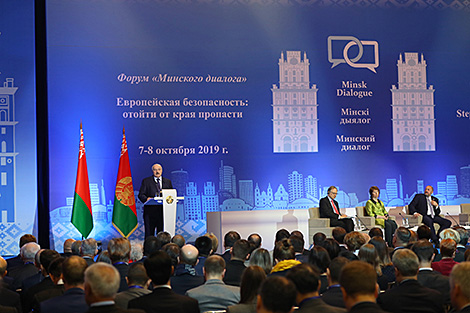
A regular session of the UN General Assembly opened in New York In September. While some politicians were making mutual accusations from the high rostrums and whispering behind the backs of their colleagues without lowering the degree of confrontation, the Belarusian delegation urged to stop the policy of ostracism and treat each other with respect and equality. The entire history of diplomacy teaches us that a common positive result is achieved only through cooperation. In this episode of BelTA’s YouTube project After the Fact: Lukashenko’s Decisions we will tell you how Belarus gained the status of a peace-loving state, what Aleksandr Lukashenko’s initiative even his Western opponents could not but support, and why, according to the Belarusian president, all European countries could and should develop together.
Belarus’ first initiatives
Belarus’ voice on the UN platform has been heard since the organization’s establishment and it is still heard today. Belarus put forward its first significant global initiative at the first session of the UN General Assembly in 1946. At the suggestion of the Belarusian delegation a resolution on extradition and punishment of war criminals was approved. In line with the document countries are supposed to take measures to look for, arrest war criminals, and hand them over to the countries where the crimes were committed.
At the BSSR’s initiative a resolution on the use of scientific and technological progress in the interests of peace and social progress was adopted in 1973. The UN declaration and resolution on the prohibition of the development and production of new weapons of mass destruction were subsequently drafted on its basis.
“Technological process must be steered in a peaceful direction”
“This year we are going to introduce a draft resolution on the prohibition of the development and manufacture of new types of weapons of mass destruction and new systems of such weapons. It is our traditional resolution. We have been introducing it since 1996. The title speaks for itself. We call on all countries of the world to renounce such actions in order to reduce the possibility of further buildup of weapons and the emergence of new, increasingly deadly weapons of mass destruction. It is our contribution to the struggle for world peace, if you will,” Permanent Representative of Belarus to the United Nations Organization Valentin Rybakov said.
The United Nations Organization adopts such resolutions by voting. Two or three countries, one of which is the United States of America, traditionally vote against the Belarusian resolution. “We understand perfectly well and realize that technological process cannot and should not be stopped or slowed down. It must be steered in a peaceful direction. It must be geared towards the wellbeing of people, not destruction and murders,” the diplomat stressed.
After the accident at the Chernobyl nuclear power plant Belarus became the initiator of the Chernobyl branch in activities of the UN and organizations of the UN system. Thus, in 1990 the UN General Assembly approved a Belarusian resolution on strengthening international cooperation and coordination of efforts to study, mitigate and minimize consequences of the Chernobyl catastrophe.
How did Belarus become an initiator of the global fight against trafficking in persons?
Once the country became independent, Belarus became even more actively involved in solving the world’s problems. Combating human trafficking became one of the most significant Belarusian initiatives on international platforms.
At the national level Belarus tackled this problem in the early 2000s. Aleksandr Lukashenko stressed: “As a head of state I should not turn a blind eye to this problem when our citizens – women, girls, boys, and kids – are lured into traps and are tortured afterwards. It pains me. I bear the state responsibility before people. I will make sure that these events will be no more in Belarus. It is easy to accomplish for us because they have not become widespread yet in our country.”
At a UN summit in 2005 Aleksandr Lukashenko put forward an initiative to step up universal efforts to combat human trafficking and a year later the international community took measures to strengthen joint actions in this area.
“Trafficking in persons has become a prosperous business. Sale of women and children into sexual slavery is commonplace. It is nearly part of the normal life. Who will protect them and call consumers of human slaves to account?” the head of state said from a UN rostrum.
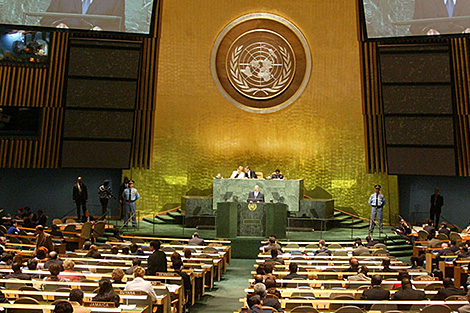
In 2010 upon Belarus’ initiative the UN General Assembly endorsed the Global Plan of Action to Combat Trafficking in Persons.
“Combating human trafficking is one of the signature initiatives that make Belarus recognizable. Belarus plays a leading role in this initiative. This year we are promoting for adoption another UN General Assembly resolution on combating human trafficking. We are now working intensively, consulting with various states and groups of states. Essentially the resolution is a concentrated effort by the international community to combat trafficking in persons in all its manifestations and in all spheres, including cybertechnology and the provision of assistance and support to victims of human trafficking. Many practical things have been done to advance the fight against this terrible criminal phenomenon to a higher level. And Belarus is recognizably one of the leaders in this process and this fact is recognized by everyone without exception,” Valentin Rybakov remarked.
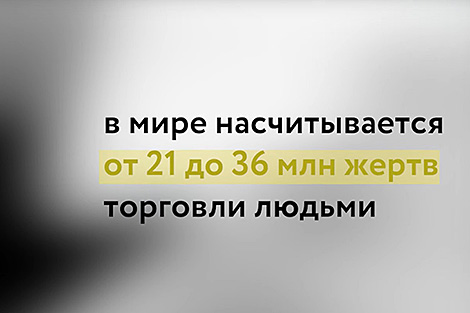
What will help tackle global challenges according to Belarus?
Here is a simple but very illustrative example of successful joint work even in the context of sharp political disagreements. In May at a session of the UN Commission on Crime Prevention and Criminal Justice Belarus initiated a draft resolution on the matter of combating human trafficking in supply chains. Initially, Western countries negatively perceived Belarus’ proposal due to political reasons. However, once they joined the negotiation process, they realized the importance of the topic and began to work towards a positive result. As a result, the resolution was adopted by consensus and all interested parties started its implementation.
“Belarus can offer the international community its experience, albeit small, in solving a number of problems such as, for example, the Chernobyl disaster and efforts to overcome its consequences, the eradication of human trafficking. Reflecting on the national experience of development, I would like to draw the following conclusion. Only an alliance of strong, responsible, effective states united by the international law system can adequately confront modern global challenges and threats. There is no doubt that our organization’s role is very important in this area,” Aleksandr Lukashenko stressed in his speech at a session of the UN General Assembly in 2015.
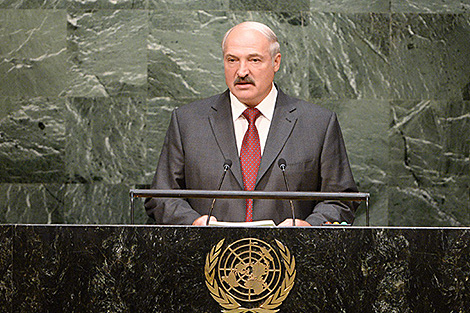
“The freedom to choose the way of development is the key condition of the democratic establishment of the world”
While addressing the United Nations Organization in 2005, Belarus President Aleksandr Lukashenko proposed to recognize the diversity of ways of progressive development as a value of human civilization. The head of state emphasized that the unipolar world is a unilinear world. Moreover, it a one-dimensional world.
“You and I have to realize that the diversity of ways towards progress is an enduring value of our civilization. Only this value can ensure stability in the world,” he noted.
According to Aleksandr Lukashenko, the freedom to choose the path of development is the main condition of the democratic establishment of the world. But do the powers that be realize this? After all, the unipolar world will eventually turn against them, the Belarusian president is convinced.
A rising number of countries speak in favor of a multipolar world order these days. What is the collective West doing meanwhile?
“We speak in favor of a multipolar, fair world with development guarantees for all countries without exception. Meanwhile, the West is busy destroying the European security system, which was created after World War Two. The United Nations has turned from a civilized dialogue platform designed to resolve disputes and discuss the future development of the world into a diplomatic casino run by Western tycoons. They run it for now. They are trying to slow down the development of individual countries and entire regions and NATO strike forces are deployed on the borders with those who disagree. We strongly disagree with these conditions,” Aleksandr Lukashenko stressed.
Belarusian initiatives to promote interests of middle-income countries, support the conventional family, and achieve sustainable development goals have also received international recognition.
“Sanctions are the worst violation of human rights”
In 2008 Belarus became one of the countries to initiate the creation of a new group of states that receive international development aid within the framework of the United Nations Organization – middle-income countries. It is a very versatile group of countries. They face multiple and diverse problems. Belarus believes that the United Nations Organization should adopt a long-term strategy with regard to these countries. For now middle-income countries are the only large group of countries in the UN without such a strategic document.
Today opposition to any unilateral coercive measures has become an important area of work on international platforms for Belarus. Simply put, sanctions. A clarification may be in order. Belarus defends not only its own interests. The problem is essentially global. Today, tens of states suffer from sanctions to a greater or lesser extent and some countries even have to deal with an economic blockade.
“Sanctions, which are imposed in circumvention of the UN Security Council unilaterally or by groups of states, are illegal and unlawful. And, in fact, they are the worst violation of human rights. The very human rights that our Western partners are so fond of talking about,” Valentin Rybakov noted.
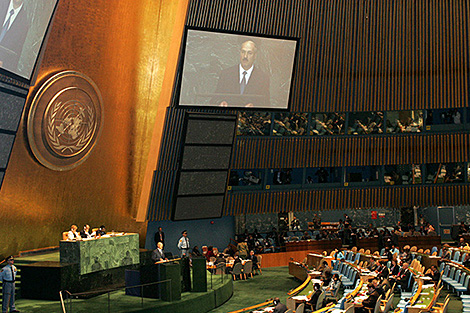
Sanctions drastically worsen living standards, directly affect the economic development of the country. They can lead to famine not just in individual countries, but on continents, the diplomat noted.
“We use the UN platform to show the whole world the criminal nature of these unilateral restrictive measures, which, I repeat, lead not to some mythical violations of human rights, but simply to hunger and death from hunger of millions and tens of millions of people. There are statistics, including UN statistics, which tell us how many millions of people will die in African countries, for example, because of the absence of Belarusian fertilizers, because fertilizers are crucial to future crops,” the diplomat noted.
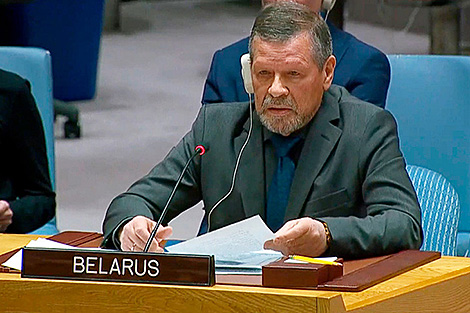
How did sanctions become a threat to food security?
Look what happens. There is enough food in the world for everyone but at the same time millions of people on the planet are starving. This contradiction is the result of the very unilateral coercive measures that Western countries impose in violation of the UN Charter against the countries they do not like. Sanctions limit the ability to export fertilizers and food to the developing countries that need them most.
Sanctions against the Belarusian potash industry became one of the main reasons for a significant increase in fertilizer prices in 2022 as a consequence of a sharp increase in prices for end food products.
According to FAO, the almost complete disappearance of Belarus from the list of potash suppliers in 2022 led to a 16% decrease in grain yields in Africa. In 2023 shipments to Africa are completely paralyzed due to Lithuanian’s actions. But now the Lithuanian port of Klaipeda, which used to handle 90% of Belarus’ export, is busy unloading American tanks. The West’s priorities are obvious.
The conclusion is simple. The global food crisis is man-made and non-systemic. Belarus believes that it can be easily solved.
“It is easy to resolve the crisis. Removing the illegal barriers will suffice. The countries that put up the barriers must remove them. And this applies not only to global food security, but also to all the other areas of international life. Unilateral coercive measures imposed by the West, directly or indirectly, against virtually all states in the rest of the world must be immediately abolished. Both common sense and the common interests of all people on the planet demand it,” Belarusian Minister of Foreign Affairs Sergei Aleinik told a session of the UN General Assembly in New York.
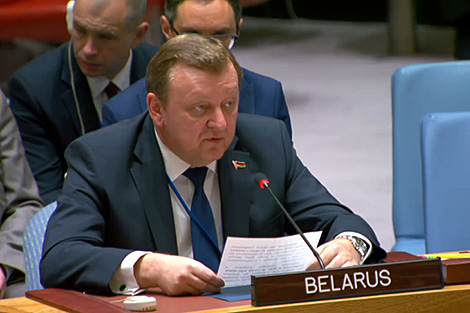
Hope for a better future
In 2017 Aleksandr Lukashenko came up with an initiative to launch a global security dialog. This proposal by Belarus was an attempt to prevent an escalation of tensions in our region and in the world as a whole. But unfortunately, it fell on deaf ears. For some reason global players looked down on the Belarusian initiative. As a result, the conflict in Ukraine flared up in the European region with renewed vigor, and the whole world suffered severe consequences in the form of economic, food and energy crises. But it is never too late to do what is right, Belarus believes. If countries want to make life on the planet safer and better, as they constantly declare from the rostrum of the United Nations Organization, they have no choice but to engage in dialog and negotiate.
The Belarusian head of state has always stressed the importance of organizing such a dialogue in the spirit of San Francisco. Indeed, the conference held in San Francisco in 1945 gave the whole world hope for a better future. At that time after long negotiations the Charter of the United Nations was agreed upon and a few months later the new international organization became a reality. It was the result of four years of work and many years of aspirations. The UN was called upon to promote peace and justice and a better life for all mankind. Today, the world needs a new hope. Truth be told, there is one “but”.
“You know the situation. We are going through a world military and political crisis the history has not seen yet. But the West does not seek a dialogue to resolve it. They don’t need a dialogue. For now. If, god forbid, the worst war in history breaks out, it will be hot not only in Warsaw, Kiev or Vilnius. We, Europe as a civilization, will disappear. But they don’t need it. Neither do we. Belarus and Russia are categorically not interested in such an outcome. Essentially, even though we have different national interests, values and traditions, we, the countries of Eastern and Western Europe, which is our common home, could and should develop together,” Aleksandr Lukashenko stressed during the solemn assembly on the occasion of Independence Day.
“Any war ends at the negotiating table sooner or later”
A century ago the famous American diplomat George Kennan tried to evaluate Soviet Russia’s relations with the West. He wrote: “Some degree of conflict and antagonism is present in any international relations. This is why some measure of compromise is necessary everywhere if political societies are to live together on the same planet”. Belarus holds the same view today and proposes to seek compromise and agreement everywhere.
“Unfortunately, a single broad, unified dialog that would unite all sides simply does not exist yet. The Republic of Belarus is trying to organize such a dialogue with mixed results, I have to admit. Not everything is working out so far, but we still hope that we will realize that any war, any armed conflict, wherever it takes place, sooner or later will end at the negotiating table. And we still hope that common sense will prevail and that we will be able to convince our colleagues, our partners of the need for such negotiations,” Valentin Rybakov said.
The diplomat pointed out that the main question that mankind faces and has always faced is the question of war and peace. “And since the next world war may simply become the last one for mankind, politicians and heads of states recognize it. We hope that the initiative of the Belarus president will elicit a response, and sooner or later all parties of the world will come to realize that some kind of a dialog is necessary to discuss these most pressing issues for humanity,” Belarus’ permanent representative to the United Nations Organization noted.
Belarus has firmly established its status of a peace-loving state. Located between the West and the East, the republic perceives its geopolitical position as a connecting link, an artery between the two sides rather than a barrier, buffer or transit lane. This role of the country has been repeatedly emphasized by Aleksandr Lukashenko. Belarus remains ready to contribute to the achievement of long-term and sustainable peace in the region, which all our peoples and all our countries need today.
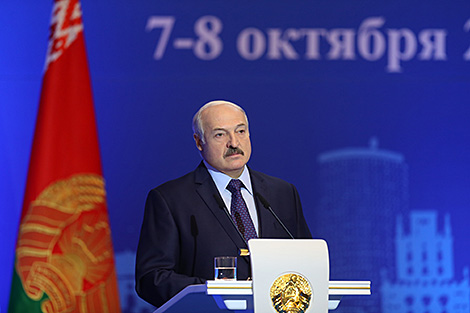


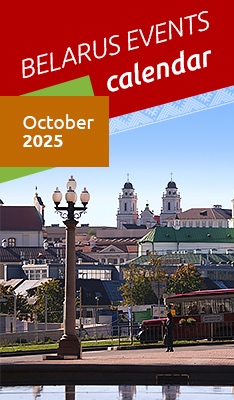




 print version
print version make home page
make home page add to bookmarks
add to bookmarks

